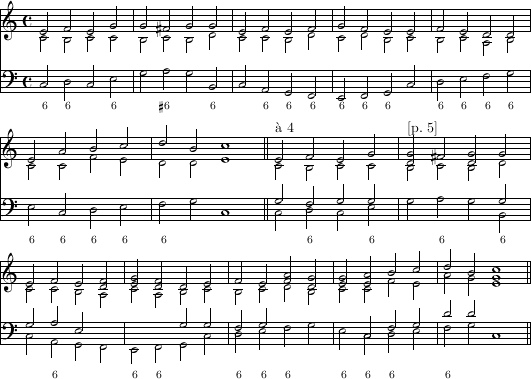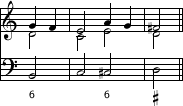|
Concentus sextilis ist, in welchen anstatt der Quint die Sext Platz hat, und
bestehet also in Terz, Sext und Octav;
|
Concentus sextilis is when the sixth takes place instead of the fifth,
and [it] has the third the sixth and the octave;
|
On appelle concentus sextilis l'accord dont la quinte est remplacée
par la sixte, donc constitué de la tierce, la sixte et de l'octave;
|
|
die Sext und die Terz füllen besser als die Octav, die Sext ist fast die
nothwendigste in diesen Grieff, welche man schwerlich entbehren kann;
|
the sixth and the third fill better than the octave, the sixth is almost the
most necessary in this Grieff, which is hardly dispensable;
|
la sixte et la tierce remplissent mieux que l'octave; dans ce Grieff,
la sixte est presque la plus importante, on ne peut pour ainsi dire pas s'en
passer;
|
|
doch kann [man] bißweilen aus Noth, wann man nur mit 3 Stimm schlagt, umb etwas
Üblers zu verbessern, die Sext auslassen, und an dieser statt die Octav mit der
Terz oder nur ein doppelte Terz ohne Octav nehmen.
|
but sometimes, when playing with three voices, one can at a pinch leave out
the sixt to improve something bad, and use instead the octave with the third
or only a doubled third without the octave.
|
mais parfois en cas de nécessité, quand on joue à trois voix, on peut omettre
la sixte pour améliorer quelque chose de mauvais et la remplacer par l'octave
avec la tierce ou seulement par une tierce doublée sans l'octave. |
Ferner ist zu merken, daß offt in diesen Concent die Octav ausbleibet;
dahero mit 4 Stimmen entweder die Terz oder die Sext duplirt werden muß, doch
ist dieser Unterschied darbeÿ zu observiren, daß, wann der Baß [p. 4] ein mi
oder harte Noten ist, die Octav zum öfftern ausbleibet, ja, wann der Baß in
einen accidentalischen  stehet, soll mit wenig Stimm gemeiniglich die
Octav vermeidet werden. stehet, soll mit wenig Stimm gemeiniglich die
Octav vermeidet werden.
|
Further one has to remark that in this chord the octave is often missing;
therefore, with four voices either the third or the sixth has to be doubled,
but this difference has to be observed that if the bass is a mi or hard note,
the octave is left out most often, especially, when the bass has an accidental
 , the octave should commonly be avoided when playing with few voices. , the octave should commonly be avoided when playing with few voices.
|
Ensuite on doit remarquer que souvent dans cet accord, l'octave manque; pour
cette raison on doit doubler soit la tierce soit la sixte quand on joue à
quatre voix; mais il faut observer que, quand la basse est un mi ou une note
dure, l'octave est normalement omise; en particulier,
quand la basse a un  accidentel, on doit éviter la sixte quand on
joue avec peu de voix. accidentel, on doit éviter la sixte quand on
joue avec peu de voix. |
In übrigen, obschon alle diese 3 Consonantien, Terz, Sext und Octav offt können
dupliert werden, wann man nit gar zu völlig schlagen muß, soll die Sext major
oder auch die Terz major, da solche absonderlich mit Hinzusetzung eines
frembden  hart gemacht worden, nit leichtlich verdoppelt seÿn. hart gemacht worden, nit leichtlich verdoppelt seÿn.
|
Furthermore, although these three consonances, third, sixth and octave can
be doubled often, one should not double the major sixth neither the major third
when they have been made hard by adding a forein  , except when one has
to play very full. , except when one has
to play very full.
|
En outre, bien que ces trois consonances, tierce, sixte et octave peuvent
souvent être doublées, on ne doit doubler ni la sixte majeure ni
la tierce majeure quand elles ont été majeurisées en rajoutant un  étranger, sauf quand on doit jouer très plein.
étranger, sauf quand on doit jouer très plein.
|
|
Die Sext minor begreifft 3 Ton und 2 semitonia majora.
|
The minor sixth contains three notes and two big half notes.
|
La sixte mineure comporte trois notes et deux grandes demi-notes.
|
|
Die sext major aber 4 Ton und einsemitonium majus.
|
But the major sixth four notes and one big half note.
|
Quant à la sixte majeure, elle comporte quatre notes et une grande demi-note
|
|
Exempl des Sextilis durch die Ziffer 6 angedeutet.
|
Example of the sextilis, assigend by the 6.
|
Exemple du sextilis, indiqué par le chiffre 6.
|
 stehet, soll mit wenig Stimm gemeiniglich die
Octav vermeidet werden.
stehet, soll mit wenig Stimm gemeiniglich die
Octav vermeidet werden.
 , the octave should commonly be avoided when playing with few voices.
, the octave should commonly be avoided when playing with few voices.
 accidentel, on doit éviter la sixte quand on
joue avec peu de voix.
accidentel, on doit éviter la sixte quand on
joue avec peu de voix.  hart gemacht worden, nit leichtlich verdoppelt seÿn.
hart gemacht worden, nit leichtlich verdoppelt seÿn.
 , except when one has
to play very full.
, except when one has
to play very full.
 étranger, sauf quand on doit jouer très plein.
étranger, sauf quand on doit jouer très plein.



